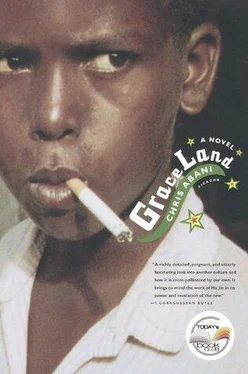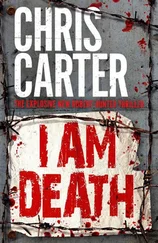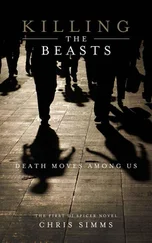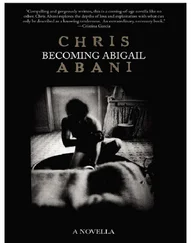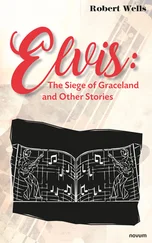It seemed that a lot of bodies were turning up dead on the train tracks in the early-morning hours, riddled with bullets. There must have been a lot of bodies found that way for one to finally make the news, Sunday thought at the time. He remembered laughing when the reporter said the police maintained that the cause of death, in each case, was “the impact of early-morning trains hitting the bodies.”
He got up, swinging skinny legs out of bed, flesh wrinkled and sagging. He yawned and stretched. Beside him, Comfort snored loudly. Her youngest child slept on a mat in the corner of the room. The things that child must see, he thought.
He slept naked, and his sex swung pendulous and full, heavy with regret for a life of too much sex and not enough love. Yawning, he pulled on a pair of babanriga pants and a loose jumper. Unlocking the door, he felt his way down the dark corridor to the backyards and the toilet. He peed, staring at the amber liquid collecting in the bowl as though he expected to divine what had woken him. As he poured the bucket of water in to flush it, he felt like his life was going down the drain.
He felt his way back to the door and stepped into the living room, standing there confused for a moment. Elvis, that was it — he wanted to talk to Elvis. He let himself out again and knocked on Elvis’s door, which opened straight out onto the veranda. The architecture in Lagos never made any sense; maximizing rent seemed to be the main design consideration. There was no answer. Still not back, he thought. Coming back into the living room, he stared at Comfort’s other two children sleeping on the cushions spread out on the floor. The thought of sitting on bare chair springs did not appeal to him.
Deciding to go back out onto the veranda, he pulled a sweater over the jumper, as he felt the cold a lot more acutely these days, and fetched a beer from the fridge chugging in the corner, giving off heat. He spotted Beatrice’s record player sitting on the sideboard where Elvis kept it. He picked it up, holding it tucked in the crook of one arm, while under the other he held some records. Balancing everything carefully with his beer, he walked out to the veranda.
After he set everything down, he put on Miles’s Kind of Blue , sat back on the bench, sipped his beer and let the music wash over him. The sky was oversalted with stars and he traced Orion’s hunt and Pegasus’ winged flight. A shooting star streaked across the sky, stirring an epiphany that disappeared out of reach as quickly as the star, leaving him with only the sense of having imagined it. He reached for his beer and took one more swig.
He played record after record, relaxing until he had no more cares than a rag flapping gently to night’s rhythm. With each record played, he seemed in search of something; the “Blue in Green,” the treads in the shoes of “Giant Steps,” musing about the true meaning of “Epistrophy,” squeezing juice from “Naima.”
That was how Elvis found him when he got home, snoring gently to the Everly Brothers. It was raining.
Elvis rescued the needle from its endless rasp over the inside track of the record. He lifted the vinyl disc off the still-spinning plate and, holding it gingerly between fingertips, blew off imaginary dust. He replaced it in the sleeve that showed the Everly Brothers wearing 1950s coifs. He watched the record player slowly spin to a stop before he shook his father’s shoulder.
“What?” Sunday said groggily.
“Go inside and sleep. You will catch a cold,” Elvis said.
Sunday yawned and stretched, coming awake.
“What time is it?”
“Three a.m.,” Elvis replied, glancing at his watch.
“Where have you been?”
“Out.” Elvis headed for his room, throwing a “Goodnight” over his shoulder.
“Wait.”
Elvis paused, his hand on the doorknob. He didn’t turn around.
“I have been waiting for you.”
Elvis turned around. “For me? For what?”
“Sit down. I need to talk to you.”
“If it is about Godfrey, forget it. There is no need.”
“It’s not about Godfrey. Sit down.”
Elvis walked over and sat on the bench next to his father. They did not look at each other, both choosing a point in the darkness to gaze out at instead.
“Benji just gave me some disturbing news yesterday.”
Elvis didn’t respond.
“He told me you have been hanging around with dat man dey call de King of de Beggars,” Sunday continued.
“Yes, he is a friend of mine.”
“What type of friend? What would make a young, well-brought-up man like you associate with beggars?”
Elvis was silent.
“De company one keeps tells a lot.”
“What does your friendship with Benji tell?”
“Elvis! I am still your father, respect me!”
Elvis looked at his father scornfully but said nothing.
“Look, Benji told me dat de King, or whatever he is, is a dangerous man.”
“How would Benji know?”
“Benji knows things. Just listen. Dey say dat de King was discharged from the army for crazy behavior.”
“When?”
“After de civil war.”
“That was a long time ago. He seems fine to me.”
“But what kind of man begs for a living?”
Elvis looked pointedly at his father.
“I am unemployed, not a beggar!” Sunday nearly shouted.
“He’s just trying to do what he thinks is right.”
“We all are. I’ve always tried to do just dat. I ran in de first free elections in nearly twenty years, as you know. Den dose army boys came back and toppled de new civilian regime. Of course, de good thing about dat was dat Okonkwo never got to enjoy his victory.”
Elvis remembered the military coup that had removed the civilian government two months into power. As always, there was the national radio broadcast, usually by a northern officer: “My pellow kwontrymen, I wish to ashwar you dat dis hasu been a bloodless coup. Dere will be no bloodshed, but we are imposing a dusk-to-dawn kerfew …” Even as the announcement was being made, army platoons would be taking out the corpses from the bloodless coup and burying them in unmarked graves. The thing that baffled Elvis the most was that everyone came out to have parades to welcome the new reigme in, as though this time for sure things would get better. But Sunday was still talking, so he tried to focus.
“It’s not because nobody tries but because de reasons are complicated. And your King, how is he fighting? By begging?”
“No. He is a poet and a regular speaker at Freedom Square. He is also an actor and uses theater to fight the government.”
“Maybe you should have run for office, not me,” Sunday said with a smile. “But de point is, how will staging plays defeat a military government? Bigger men, like Wole Soyinka, have tried, but nothing changes. If he cannot do it, how can a beggar?”
“I don’t know. I think everyone is just trying to find their way.”
“Are dey finding de way, dese people you speak of?”
“I don’t know, but I do know some people are trying very hard and others are not.”
“So?”
“So they will eventually find a way.”
“Who are ‘dey’ dat you speak of? Do you even know?”
Elvis shrugged and looked away. Sunday chuckled.
“What?” Elvis asked.
“You sound grown. Like a man; yet you are not a man, and so dis is only de voice of others speaking through you.”
“What?”
“Elvis, sometimes even good people use us.”
“Who is using us?”
“I am saying dat dis King is using you.”
“To do what?”
“Who knows? But Benji says all dis political agitation is a front, dat it is to help him find and kill de officer dat killed his family during de war. Dis is not for change, but revenge.”
Читать дальше
